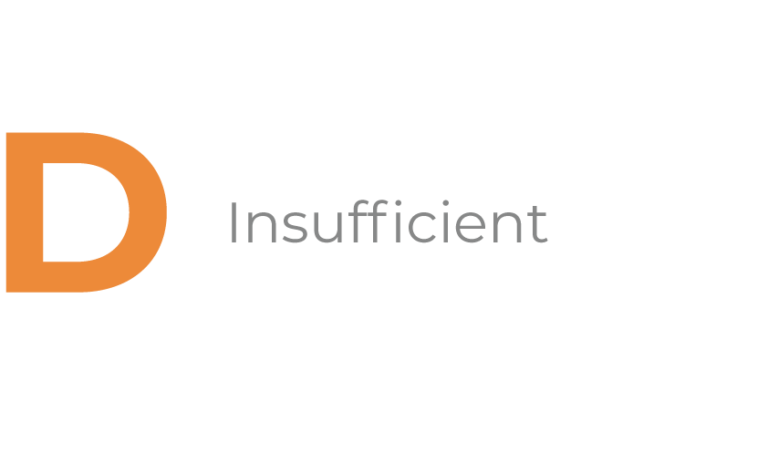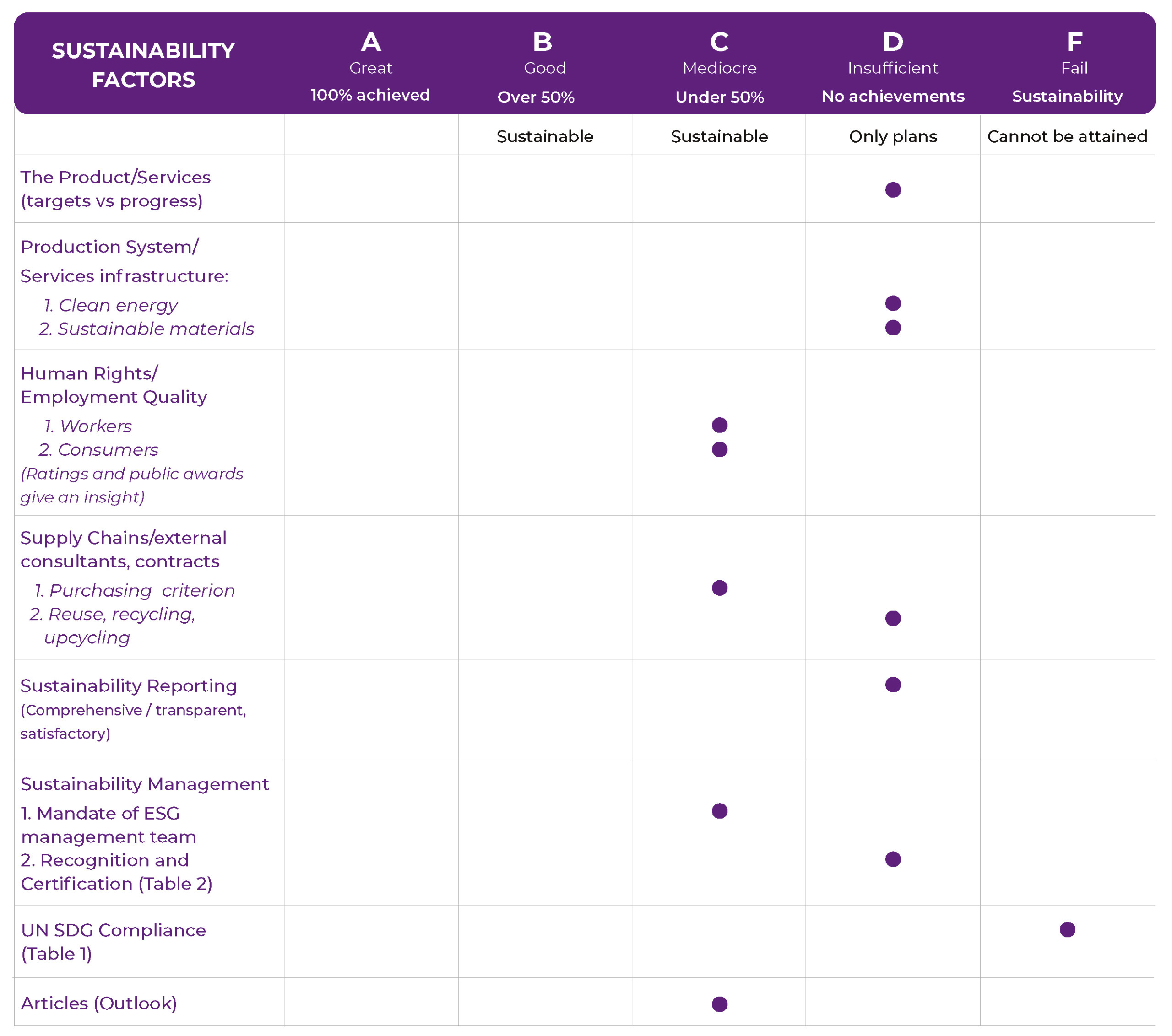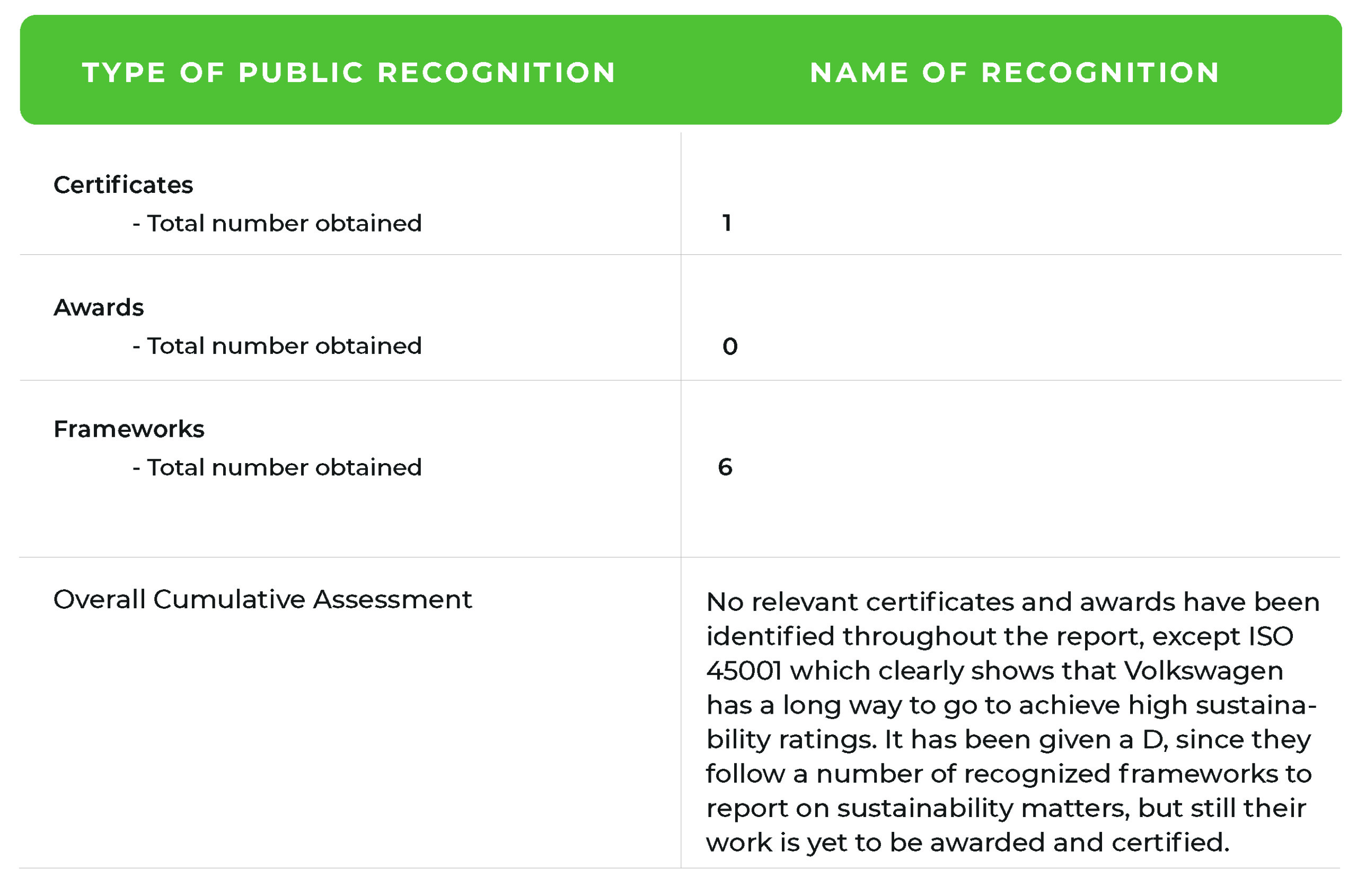
Index Sustainability Report for Volkswagen

Company Evaluation
The Volkswagen Group Sustainability Report was prepared in compliance with the GRI Standards of the Global Reporting Initiative (GRI). Ernst & Young GmbH Wirtschaftsprüfungsgesellschaft (EY) conducted a voluntary, limited assurance audit on the nonfinancial report to verify that its disclosures comply with the relevant statutory requirements. The nonfinancial report, published annually, was published on March 16, 2022 and in addition to information about the Group’s sustainability activities in the 2021 fiscal year (January 1 to December 31, 2021), this 2021 nonfinancial report also contains selected information from the 2022 fiscal year. The information in this report relates to the Volkswagen Group as a whole, unless indicated otherwise, and any information provided for the Group also applies to Volkswagen AG. The Group includes all major subsidiaries inside and outside Germany that are directly or indirectly controlled by Volkswagen AG, in addition to Volkswagen AG.
The report does not follow the SDG targets, the company only mentions the SDGs relevant to each of the business categories that is involved with sustainability activity, such as Decarbonization, Circular Economy, Responsibility in Supply Chain and Business, People & Transformation, Diversity and Integrity. The information on targets and progress is communicated in the focused areas mentioned above, but it is not easy to identify, nor easy to follow the progress on the targets identified.
There are plenty of initiatives that VW is currently working on that are aimed to deliver results by 2025 or by 2030. However some of the initiatives seem too ambitious to be accomplished, considering the little progress the company is making. For example, considering in 2021, sales of EVs in Europe were at 7.9%, sales are expected to increase to 70% in just 9 years. There are many factors that will contribute to these increases, which is not only controlled by VW, although they are developing partnerships and investing in technology to get there, there are also external considerations that may or may not contribute to the achievement of these goals. On the other hand, what can be controlled by VW, more in the people management, it also appears that the company is moving slow, with no specific targets set for diversity and inclusion of the workforce, training programs, considering the need for innovation and transformation. Furthemore, including Integrity, as a focus area to achieve Sustainability, the company wants to ensure that integrity and compliance maintain the same strategic and operational priorities such as sales revenue, profit, product quality or employer attractiveness. Anyone in the sustainability field could argue that as long as the priority remains sales, revenue and profit, over product quality or environmental impact, Volkswagen might not reach their commitments to sustainability. Additionally, considering the structure of the Members of the Board with voting rights, as identified in the NYT Article, by Jack Ewing does not provide a positive perspective towards achieving sustainable goals either.
No Awards identified throughout the report, only a readmission to the UN Global Compact in 2021; one ISO Certificate for occupational health and safety management systems that covers only 29% of the workforce, contribute further to the low rating.
Wolkswagen has a long way to prove itself as a sustainable leader in the automotive industry, at the moment, only the plans can provide the company with a D rating and a neutral outlook.
Outlook: Neutral
Volkswagen Sustainability Scorecard

Sector
Automotive.
NAICS 1: 423110 – Automobile and Other Motor Vehicle Merchant Wholesalers
NAICS 2: 423120 – Motor Vehicle Supplies and New Parts Merchant Wholesalers
Technical Annex
Website
Contact
Berliner Ring 2, Wolfsburg 38440 Germany
(0049) 5361 9 0
Stock Ticker
VOW3.DE
Volkswagen Activity
In brief
Volkswagen AG is the parent company of the Volkswagen Group. It engages in the production and sale of passenger cars and light commercial vehicles for the Volkswagen Passenger Cars and Volkswagen Commercial Vehicles brands. As a parent company, Volkswagen AG holds direct or indirect interests in AUDI AG, SEAT S.A., ŠKODA AUTO a.s., Dr. Ing. h.c. F. Porsche AG, TRATON SE, Volkswagen Financial Services AG, Volkswagen Bank GmbH and a large number of other companies in Germany and abroad. It operates through the following segments: Passenger Cars, Commercial Vehicles, Power Engineering, and Financial Services are its business segments. The Passenger Automobiles and Light Commercial Vehicles section creates vehicles, engines, and vehicle software, as well as producing and selling passenger cars and related parts. The Commercial Vehicles business designs, manufactures, and sells trucks and buses, as well as providing spares and related services. Power Engineering is a division that provides large-bore diesel engines, turbomachinery, and propulsion components. Finance for dealers and customers, leasing, banking and insurance, fleet management, and mobility services are all provided by the Financial Services section. Motorcycles are also available from the firm.
Employees
Volkswagen Sustainability Activity
Activity
The Group’s new strategy is “NEW AUTO – Mobility for Generations to Come”, in which Volkswagen Group wants to drive transformation from a vehicle manufacturer to a world-leading, software-driven mobility provider. A company, where they redefine mobility while doing business climate neutrally and conscientiously. Additionally, according to Volkswagen, the NEW AUTO world will be free of emissions, smarter and above all more sustainable with more electric cars on the road. For 2021 to be recorded as an achievement, Volkswagen is the e-mobility market leader in Europe and the number two in the USA. The company is working on expanding the charging infrastructure in Europe, China and the USA to 45,000 charging points by 2025. They also have plans to build six battery factories by 2030 together with partners and deal with entire battery cycles. And electric drives bring economic advantages in the truck segment as well.
Revenue and Market Cap
Annual Revenue: 250,199 million
Market Cap: 80.073 billion
Sustainability/ESG Awards, Ratings & Rankings
ESG Ratings
- MSCI B = rating
- Sustainalytics 29.6 (medium risk)
- ISS ESG = C rating
- CDP Water Disclosure – A Rating
Awards
N. a.
Highlights from Volkswagen Sustainability Report
Achievements
No achievements worth mentioning in this section
Weaknesses and Setbacks
Not many indicators available to track the company’s progress towards sustainability
Certificates
- ISO 45001 (occupational health and safety management systems)
Volkswagen in the news: Press, Reviews and Social Media
In the News
1.New York Times (Jack Ewing on March, 2021) – How Volkswagen’s Sins Fueled Its Redemption
The article presents facts that despite Volkswagen presenting an advantage over Tesla, in terms of the price for passenger cars and a new standardised platform, The Modular Electrification Toolbox, corporate governance experts, continue to express concerns over the lack of outside oversight, that may continue to contribute to the toxic corporate culture. Considering that voting rights belong 53% to the Members of the secretive Porsche and Piëch families, 20% to the government of the state of Lower Saxony, 17% to the sovereign wealth fund of Qatar and only less than 10% to the outside shareholders, this structure will not allow to expose the company to more scrutiny. Moreover, only one out of the 20 members of the Supervisory Board, is not a representative of the three main shareholders, nor a Volkswagen employee. In this type of governance structure, one could agree that decisions at the company level will be influenced by the interest of the three main shareholders.
The article is written by Georg Kell, a member of Volkswagen’s Sustainability Council and mainly discusses the company’s journey, from an ‘emission cheater’ to a ‘climate leader’. The council, formed in 2016, after the “Dieselgate” scandal was formed to help the company’s transformation into a world-leading provider of sustainable mobility. Many challenges were encountered along the way, from the diversity of the Council’s representatives, from different backgrounds and with specific skills, to high-ranking managers that had been working with diesel engines their entire life and lastly, union workers’ concerns over job losses due to e-mobility production and digitalization. Despite all these challenges, the Council worked together to propose a set of strategic changes to Volkswagen’s management, such as a technology shift with a focus on decarbonization; a policy shift advocating for ambitious standards and a cultural shift towards a more ethical, collaborative and purpose-driven company. Positive results from focusing on these changes came in the form of re-admission to the UN Global Compact where Volkswagen committed to embrace sustainability issues. Furthermore, the company’s climate leadership was acknowledged by the Science Based target Initiative for the best practices in terms of GHG emission reductions. From a position where Volkswagen had to catch up with the transformation within the car industry, what they have accomplished, the world is now catching up. The Council’s contribution has been acknowledged by the CEO Diess, as a ‘driver and a corrective for our strategy”. Moreover, Georg Kell, mentions in the article that a spirit of innovation, motivation and collaboration, as well as continuing to see sustainability as an important driver, will still be needed to achieve the massive transformation that Volkswagen has embarked on.
Standards and Frameworks
- Global Reporting Initiative (GRI)
- Sustainability Accounting Standard Board (SASB)
- Un Global Compact
- UN Sustainable Development Goals (UN SDGs)
- German Commercial Code
- Task Force on Climate Related Financial Disclosures (TCFD) > Climate Protection
Table 1: Targets vs Progress Reported

Table 2: UN SDGs Compliance Analysis

Table 3: Sustainability Certificates, Awards and Listings










